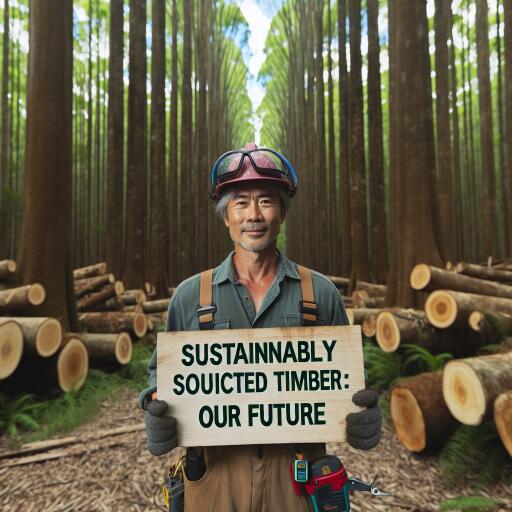
Miles Advocates for Queensland Timber’s Strong, Sustainable Future
In a significant move towards environmental sustainability and economic stability, the Queensland government, under the leadership of Premier Steven Miles and Deputy Premier Cameron Dick, has recently unveiled a groundbreaking initiative aimed at fostering a resilient and sustainable timber industry for the coming three decades. This visionary plan, dubbed the Queensland Sustainable Timber Industry Framework, is setting the stage for a vibrant future for timber in Queensland.
The initiative is propelled by a generous $200 million financial package, earmarked to bolster the timber industry’s evolution. This investment is poised to underpin various strategic actions that are crucial for achieving the long-term objectives of the framework. Key focus areas include the expansion of timber plantations and the infusion of innovation into timber processing methodologies. Moreover, the package contemplates financial subsidies to mitigate rising transport costs, thereby ensuring the industry remains competitive and sustainable.
Moreover, the initiative stresses the importance of enhancing accreditation and certification processes. Also, it includes a comprehensive educational outreach aimed at engaging landholders and traditional owners, further emphasizing the commitment to an inclusive and collaborative approach to timber industry reform. A pivotal component of this comprehensive strategy is a state-wide biodiversity assessment, aimed at informing sustainable forest management practices, thereby maintaining the delicate ecological balance vital for the survival of threatened species and ecosystems.
Ensuring a consistent and sustainable timber supply is at the heart of the framework’s objectives. This is critical not only for meeting Queensland’s housing needs but also for underpinning the state’s $107 billion construction sector. The framework commits to maintaining the current timber supply levels until 2034, a strategic move that underscores the government’s dedication to both the environment and the economy. Plans include exploring sustainable harvesting in various regions and reviewing the regulatory landscape to enhance private native timber management.
The framework’s ambitions are supported by the announcement of the establishment of a new Greater Glider Forest Park, a testament to the government’s investment in protecting high-value ecosystems and threatened species. This area, set aside for conservation, symbolizes a balance between industry growth and environmental stewardship, illustrating a forward-thinking approach to natural resource management.
The development of this framework is not an isolated effort but represents a collaborative endeavour involving a wide array of stakeholders, including timber workers, industry experts, and environmental advocates. A dedicated stakeholder advisory group is slated to play a crucial role in bringing this framework to fruition, with the strategic plan expected to be fully operational by mid-2025.
As the framework unfolds, temporary measures will ensure continuity in the timber industry. These include the extension of harvesting permits for the Eastern Hardwoods, besides specific areas earmarked for conservation, ensuring a smooth transition towards the new regulatory regime. This interim solution reaffirms the government’s commitment to supporting the timber industry and its workers during this period of transition.
In their statements, Premier Steven Miles and Deputy Premier Cameron Dick encapsulated the essence of this historic initiative. Emphasizing the critical role of the timber industry in Queensland’s socio-economic fabric, they reiterated the government’s pledge to sustain the industry’s growth while prioritizing environmental preservation and community welfare. This holistic approach exemplifies a model of governance that aligns economic development with ecological conservation, setting a benchmark for sustainable industry practices.
Through this ambitious framework, Queensland is not only charting a course for the future of its timber industry but also demonstrating a commitment to safeguarding its natural heritage for future generations. It presents a blueprint for balancing industrial progress with environmental sustainability, a guiding principle that promises to steer Queensland towards a greener and more prosperous future.





Leave a Reply